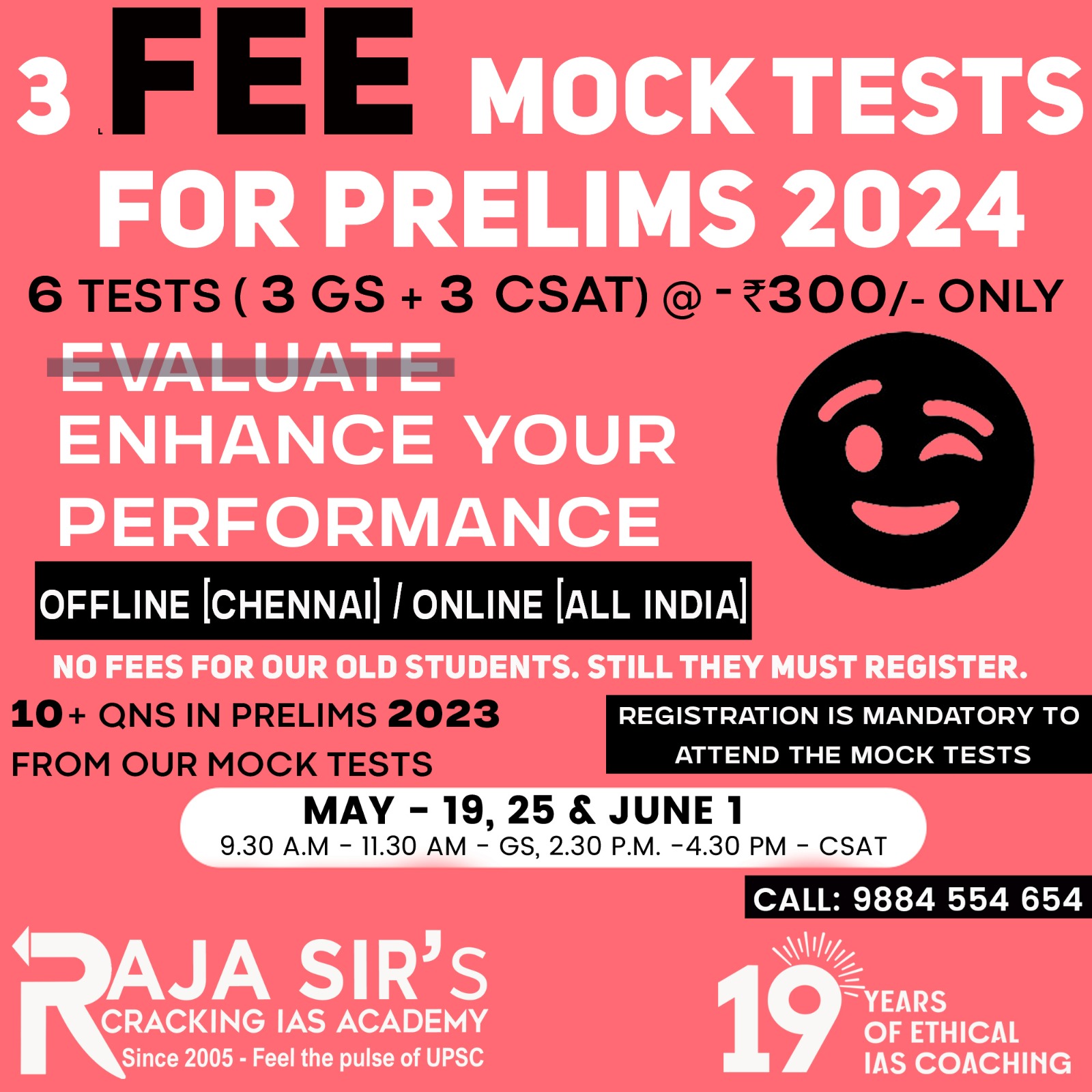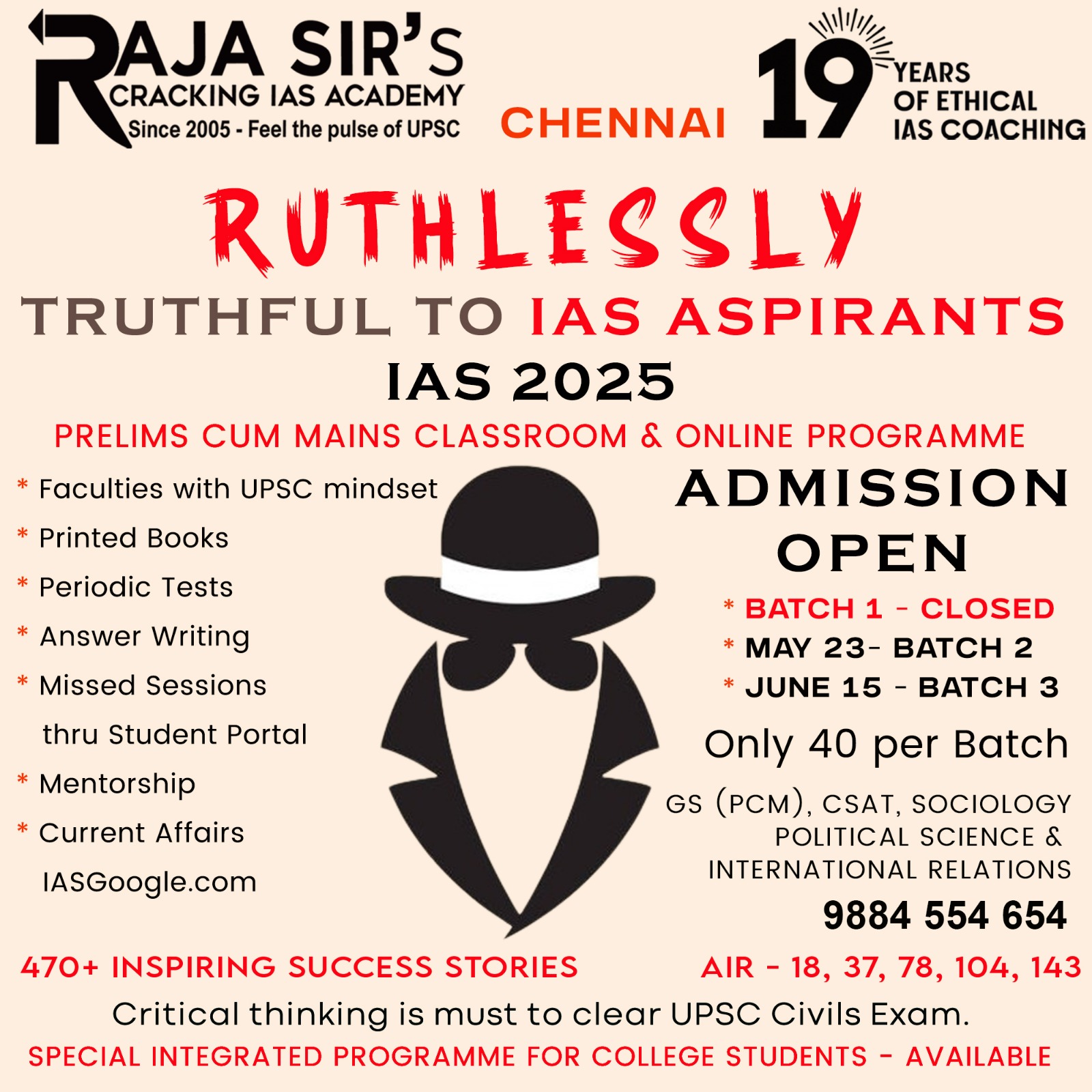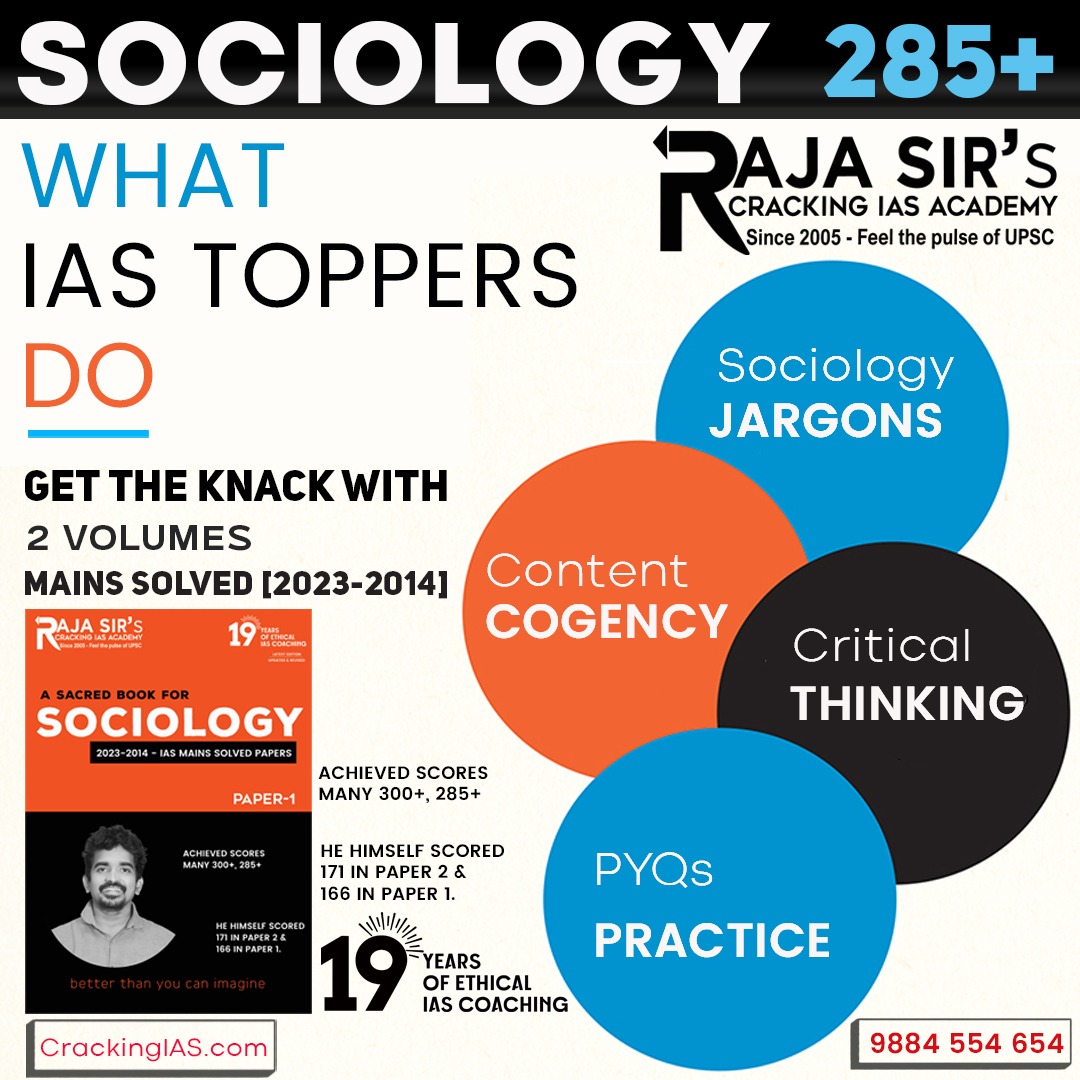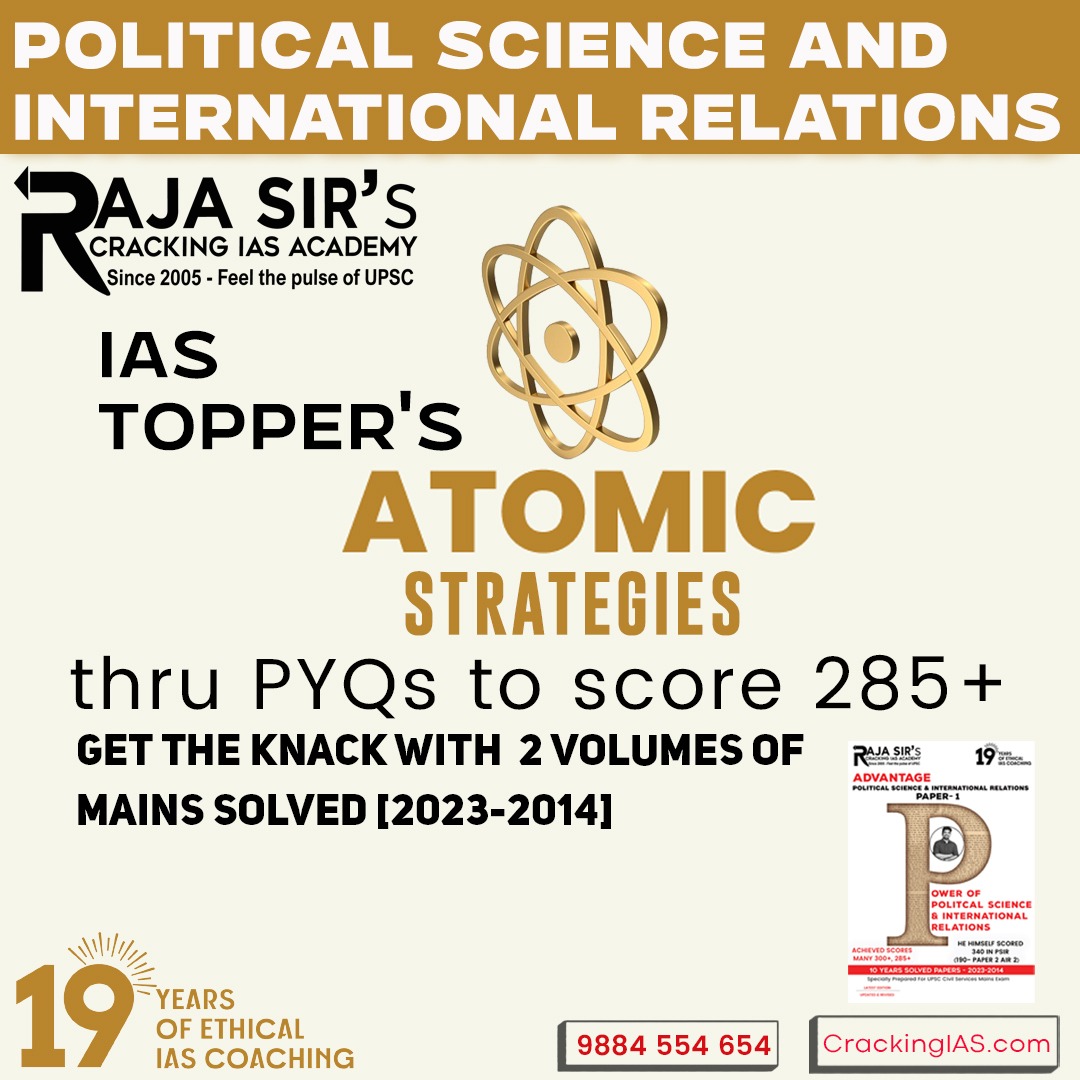- Home
- Prelims
- Mains
- Current Affairs
- Study Materials
- Test Series
Hit List Questions 21- PPP 100 PRELIMS 2024 - 39
Questions & Explanations:
|
1. |
Consider the following statements regarding TEMPO satellite: (i) It is in geostationary orbit. (ii) It monitors air pollution hourly over the enire globe. (iii) It is a joint initiative of NASA and ISRO. (a) (i) only (b) (i) & (ii) only (c) (ii) & (iii) only (d) (i), (ii) & (iii) Note: |
a |
|
2. |
W.r.t. International Energy Agency, consider the following statements: 1. It is an UN Body. 2. India is an Association country in it. Which of these statements is/are correct? (a) 1 only (b) 2 only (c) Both 1 and 2 (d) Neither 1 nor 2 Note: The International Energy Agency (IEA), which has its headquarters in Paris, France was set up as an autonomous agency in 1974 by member countries of the Organisation for Economic Cooperation and Development(OECD) in response to the mid-1970s oil crisis. The IEA''s main focus is on energy policies, which include economic development, energy security, and environmental protection. The IEA also plays a major role in providing information related to the international oil market and taking action against any physical disruptions in the supply of oil. Members: The IEA family is made up of 31 member countries, 13 association countries including India, and 4 accession countries. A candidate country to the IEA must be a member country of the OECD. Major Reports: World Energy Outlook. World Energy Investment Report. India Energy Outlook Report. |
B |
|
3. |
With reference to the Indian One-Horned Rhino, consider the following statements: 1. Its status is Critically endagered on the IUCN Red List. 2. It is in Schedule I under Wildlife Protection Act, 1972. 3. It is in Appendix II of CITES. Which of these is/are incorrect?. (a) 1 only (b) 2 only (c) 1 and 3 only (d) 1, 2, 3 Note: · According to a recent study, published in the latest edition of People and Nature by the British Ecological Society, which used an interesting research approach—analysing artwork and photographs of the animal spanning more than five centuries. · It relied on a repository of images maintained by the Netherlands-based Rhino Research Centre (RRC). Major Findings: · Found evidence for declining horn length over time across species, perhaps related to selective pressure of hunting, and indicating a utility for image-based approaches in understanding societal perceptions of large vertebrates and trait evolution · The horns of rhinoceroses may have become smaller over time due to the impact of hunting. · The study found that the rate of decline in horn length was highest in the critically-endangered Sumatran rhino and lowest in the white rhino of Africa, which is the most commonly found species both in the wild and in captivity. · This observation follows patterns seen in other animals, such as tusk size in elephants and horn length in wild sheep, which have been driven down by directional selection due to trophy hunting. · During the age of European imperialism (between the 16th and 20th centuries), rhinos were commonly portrayed as hunting trophies, but since the mid-20th century, they have been increasingly portrayed in a conservation context, reflecting a change in emphasis from a more to less consumptive relationship between humans and rhinos. · The Indian rhino featured more in early artwork, but the number of images of other species, particularly white rhinos, has increased since the mid-19th century. Rhinos: · Rhinos have long been hunted for their horns, which are highly valued in some cultures. · The five surviving rhino species (Black and White African rhino, Asian rhino species – greater one horned, Sumatran and Javan rhinos) are still threatened by habitat loss and hunting. IUCN Status: · Greater one horned Rhino: Vulnerable · Sumatran Rhino: Critically Endangered · Javan Rhino: Vulnerable · Black African Rhino: Critically Endangered · White African Rhino: Near Threatened Greater One-Horned Rhinoceros: · Also known as Indian rhino, it is the largest of the rhino species. · India is home to the largest number of Greater One-Horned Rhinoceros in the world. · At present, there are about 2,600 Indian rhinos in India, with more than 90% of the population concentrated in Assam’s Kaziranga National Park. Habitat: · The species is restricted to small habitats in Indo-Nepal terai and northern West Bengal and Assam. · In India, rhinos are mainly found in · Kaziranga NP, Pobitora WLS, Orang NP, Manas NP in Assam, · Jaldapara NP and Gorumara NP in West Bengal · Dudhwa TR in Uttar Pradesh. Protection Status: · IUCN Red List: Vulnerable. · CITES: Appendix-I · Wildlife Protection Act, 1972: Schedule I. |
C |
|
4. |
Lunar Polar Exploration Mission (LUPEX) is a collaborative venture between (a) India-Japan (b) US-India (c) India - France (d) Russia-India Note: |
A |
|
5. |
With reference to World Food Price Index, consider the following statements: 1. It is a measure of the annual change in international prices food commodities which is released by Food and Agriculture Organization. 2. Sugar price is one of the sub indices included in the World Food Price index. Which of the statements given above is/are correct? (a) 1 only (b) 2 only (c) Both 1 and 2 (d) Neither 1 nor 2 Note: FAO Food Price Index · The Food and Agriculture Organization’s (FAO) food price index is a measure of the monthly change in international prices of a basket of food commodities. · It consists of the average of five commodity group price indices (cereal, vegetable, dairy, meat, and sugar), weighted with the average export shares. · Base year: 2014-16 · It is a specialised agency of the United Nations that leads international efforts to defeat hunger and improve nutrition and food security. · Its goal is to achieve food security for all and make sure that people have regular access to enough high-quality food to lead active, healthy lives. · Headquarter: Rome (Italy). · Member countries: With 195 members - 194 countries and the European Union, FAO works in over 130 countries worldwide. · The World Food Programme (WFP) and the International Fund for Agricultural Development (IFAD) are its sister bodies. · Reports published by the FAO: The State of the World''s Forests (SOFO), The State of World Fisheries and Aquaculture (SOFIA), The State of Agricultural Commodity Markets (SOCO), The State of Food Security and Nutrition in the World (SOFI). https://www.deccanherald.com/business/world-food-price-index-falls-in-october-fao-2755419 |
B |
|
6. |
Benefits of Carbon Sequestration include (i) use in construction material (ii) to produce synthetic diesel (iii) to produce dry ice Select the correct answer using the code given below: (a) (i) only (b) (ii) only (c) (i) & (ii) only (d) (i), (ii) & (iii)
Note: Carbon Capture and Storage (CCS) It is a process designed to mitigate the emissions of carbon dioxide (CO2) generated from industrial processes and the burning of fossil fuels, particularly in power plants. The goal of CCS is to prevent a significant amount of CO2 from entering the atmosphere and contributing to global warming and climate change. Approaches: Carbon capture and storage (CCS) encompasses two primary approaches: The first method is known as point-source CCS, which involves capturing CO2 directly at the site of its production, such as industrial smokestacks. The second method, direct air capture (DAC), focuses on removing CO2 that has already been emitted into the atmosphere. The recent UK initiatives specifically target point-source CCS. Mechanisms of Point Source- CCS: The process of carbon capture and storage encompasses several distinct steps, each contributing to the effective containment of CO2 emissions: Capture: CO2 is isolated from other gases generated during industrial processes or power generation. Compression and Transportation: Once captured, CO2 is compressed and transported to designated storage sites, frequently through pipelines. Injection: The CO2 is then injected into subterranean rock formations, often situated at depths of one kilometer or more, where it remains stored for extended periods, sometimes lasting decades. Applications: Mineralization: Captured carbon can be reacted with certain minerals to form stable carbonates, which can be stored safely underground or used in construction materials. This process, known as mineral carbonation, offers a long-term and secure method of carbon storage. Synthetic Fuels: Captured CO2 can be combined with hydrogen (often produced via electrolysis using renewable energy) to produce synthetic fuels such as synthetic natural gas, synthetic diesel, or even synthetic jet fuel. Greenhouses and Indoor Agriculture: Captured carbon dioxide can be supplied to greenhouses and indoor farming facilities to enhance plant growth. Dry Ice Production: Captured carbon dioxide can be used to produce dry ice, which is solid carbon dioxide at extremely low temperatures. Dry ice has various applications, including shipping and transportation of perishable goods, medical and scientific purposes, and special effects in the entertainment industry. |
D |
|
7. |
With reference to India Middle East Europe Corridor (IMEC), consider the following statements: 1. It was launched during the 18th Summit of G20, which was hosted by India. 2. It forms part of the Partnership for Global Infrastructure and Investment. Which of the statements given above is/are correct? (a) 1 only (b) 2 only (c) Both 1 and 2 (d) Neither 1 nor 2 Note: https://iasgoogle.com/editorial_detail/india-middle-east-europe-corridor |
A |
|
8. |
Consider the following statements w.r.t. Kigali Amendment: 1. It is a legally binding agreement between the signatory parties with non-compliance measures. 2. It seeks to eliminate 80-90% of the HFCs currently in use by the year 2050. Which of these statements is/are correct? (a) 1 only (b) 2 only (c) Both 1 and 2 (d) Neither 1 nor 2 Note: |
C |
|
9. |
The authority to oversee the Loss and Damage Fund created at at COP 27 is (a) ADB (b) IMF (c) NDB (d) None of these Note: |
D |
|
10. |
Consider the following: 1. Reduced Speculative Risks 2. Stabilizing Inflation 3. Enhanced Export Competitiveness How many of these is/are the benefits of Dollarisation of an economy? (a) Only one (b) Only two (c) All three (d) None
Note: Limited Export Competitiveness - Loss of control over the exchange rate can restrict a country''s ability to use currency devaluation as a tool to enhance export competitiveness. |
B |
|
11. |
Which of the above statements is/are incorrect w.r.t. the news headline “A23a Drifts”?. 1. It is the world''s largest iceberg in Antarctica. 2. It is moving towards South Georgia Island. Which of the statements given above is/are correct? (a) 1 only (b) 2 only (c) Both 1 and 2 (d) Neither 1 nor 2 Note: |
C |
|
12. |
"Matangini Hazra" walked into a barrage of bullets, holding the Indian flag up high during (a) Quit India Movement (b) Non-Cooperation Movement (c) Swadeshi Movement (d) Civil Disobedience Movement Note: https://indianexpress.com/article/explained/explained-history/remembering-matangini-hazra-8961624/ |
A |
|
13. |
Rhodopsins that were in news refer to (a) Antigens (b) Proteins (c) Plasmids (d) Interferons Note: |
B |
|
14. |
Which of the following statements is/are correct w.r.t. “Yom Kippur war”? 1. It was fought in 1973 between Israel, Egypt and Syria. 2. It ended in an Israeli victory. Select the correct answer using the code given below: (a) 1 only (b) 2 only (c) Both 1 and 2 (d) Neither 1 nor 2 Note: |
C |
|
15. |
Liptako-Gourma Charter is an architecture of (a) collective defence (b) collective security (c) collective bargaining (d) collective transformation Note: |
A |
|
16. |
With reference to the Gurez valley, which of the following statements is/are correct? 1. It is in Arunachal Pradesh. 2. It is home to ibex, musk deer and marmots. Select the correct answer using the code given below: (a) 1 only (b) 2 only (c) Both 1 and 2 (d) Neither 1 nor 2
Note: · The high-altitude passes of the Gurez valley in north Kashmir are all set to connect with the Mushkoh valley, in Kargil’s Drass Sector, Ladakh, the site of the war in 1999. · The 130-km road has been opened up for tourists. Kaobal Gali, the highest pass at a height of 4,166.9 metres in Gurez, connects the two valleys. Gurez valley: · Located in the Kashmir valley. · The valley lies near the Line of Control, which separates it from the Astore and Neelum districts of Pakistan-administered Kashmir. Being situated very close to the Burzil Pass, which leads into Astore, the inhabitants are ethnic Dards/Shins. They speak the Shina language and have the same styles of dress and culture as their kinsmen in Pakistani-administered Gilgit-Baltistan. · Zumba yak (smaller than other yaks) is found in the Buduaab village, Gurez valley. · Gurez valley was one of the sites of the Kargil war. · The Gurez valley is close to the Line of Control (LoC) with the Kishanganga river demarcating the line in several parts. · The Gurez valley is one of few habitations in Kashmir where villages with only log houses exist, with no intervention of urban concrete materials. · It has diverse fauna and wildlife including the Himalayan brown bear and the snow leopard. It is also home to ibex, musk deer and marmots. · The Gurez valley, with about 38,000 residents, is already setting a record by hosting 50,000 tourists this year so far. Mushkoh valley: · Situated in Dras (Ladakh) and Also known as the valley of wild tulips. · The Mushkoh valley, dotted with meadows of flowers, was in the news when Tiger Hill witnessed a bloody battle between India and Pakistan, leaving hundreds of soldiers dead on both sides. · The meadows of Mushkoh offer boisterous wild tulip flowers. The valley is also home to the endangered Himalayan yew. |
B |
|
17. |
1. The Gaza Strip is only 41 km long. 2. The Gaza Strip is bordered by Israel and Egypt. Which of the statements given above is/are incorrect? (a) 1 only (b) 2 only (c) Both 1 and 2 (d) Neither 1 nor 2 Note: |
D |
|
18. |
Consider the following statements w.r.t. Global Biofuel Alliance. (1) It is an India led initiative. (2) All G20 members and non-member countries are a part of the alliance. Choose the correct statement: (a) 1 only (b) 2 only (c) Both 1 and 2 (d) Neither 1 Nor 2 Note: Global Biofuels Alliance:
What is Biofuel?
|
C |
|
19. |
Least Developed Countries Report 2023 is released by (a) WTO (b) UNCTAD (c) WEF (d) IMF Note: UNCTAD''s Trade and Development Report Technology and Innovation Report |
B |
|
20. |
Which of the following statements are true?. (i) India’s GDP deflator is dominated by the Wholesale Price Index. (ii) India consistently uses the Income Side approach for calculating GDP growth. (a) (i) only (b) (ii) only (c) Both (i) and (ii) (d) Neither (i) nor (ii) Note: https://iasgoogle.com/editorial/govt-dismisses-criticism-regarding-inflated-gdp |
C |
|
21. |
Consider the following statements about Methane: 1. It is the primary contributor to the formation of ground-level ozone. 2. It is less potent at warming than carbon dioxide. 3. Wastewater treatment releases methane. (a) 1 and 3 only (b) 2 and 3 only (c) 1, 2 and 3 (d) 3 only
|
A |
|
22. |
The term LULUCF seen in news sometimes refer to the context of (a) Milky Way Galaxy (b) Forestry (c) Global Minimum tax (d) Logistics Index Note: |
B |
|
23. |
With reference to “reverse fault” consider the following statements: 1. It occurs when tectonic plates collide, causing the Earth’s crust to thicken. 2. It is common in areas of compression. Which of these statements is/are correct? (a) 1 only (b) 2 only (c) Both 1 and 2 (d) Neither 1 nor 2 Note: |
C |
|
24. |
Sickle cell belt in India includes (a) Chhattisgarh, West Bengal, Uttar Pradesh, (b) Chhattisgarh, Nagaland, Uttar Pradesh, Bihar (c) Chhattisgarh, Bihar, Delhi, Maharashtra (d) Chhattisgarh, West Bengal, Nagaland, Bihar Note: Maharashtra, Madhya Pradesh, Jharkhand, Gujarat, Odisha, Kerala and Rajasthan. Collectively, these are referred to as the sickle cell belt. |
A |
|
25. |
Belem declaration deals with which of the following? (a) Conservation of Sundarbans (b) Reducing Mercury Pollution (c) Conservation of Amazon rainforests (d) Reducing Cadmium Pollution Note: |
ü C |









 Latest News
Latest News



 Note:
Note: General Studies
General Studies